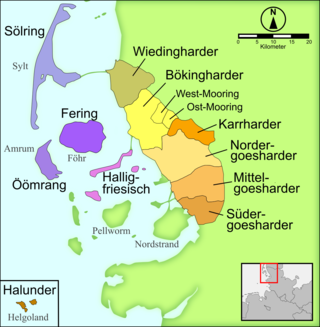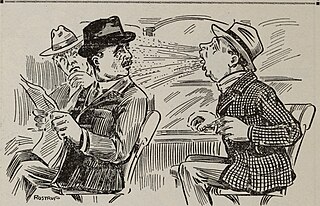
Austrian German, Austrian Standard German (ASG), Standard Austrian German, Austrian High German, or simply just Austrian, is the variety of Standard German written and spoken in Austria and South Tyrol. It has the highest sociolinguistic prestige locally, as it is the variation used in the media and for other formal situations. In less formal situations, Austrians use Bavarian and Alemannic dialects, which are traditionally spoken but rarely written in Austria. It has been standardized with the publishing of the Österreichisches Wörterbuch in 1951.

A dictionary is a listing of lexemes from the lexicon of one or more specific languages, often arranged alphabetically, which may include information on definitions, usage, etymologies, pronunciations, translation, etc. It is a lexicographical reference that shows inter-relationships among the data.

Archie is a tool for indexing FTP archives, allowing users to more easily identify specific files. It is considered the first Internet search engine. The original implementation was written in 1990 by Alan Emtage, then a postgraduate student at McGill University in Montreal, Canada.

Wiktionary is a multilingual, web-based project to create a free content dictionary of terms in all natural languages and in a number of artificial languages. These entries may contain definitions, images for illustration, pronunciations, etymologies, inflections, usage examples, quotations, related terms, and translations of terms into other languages, among other features. It is collaboratively edited via a wiki. Its name is a portmanteau of the words wiki and dictionary. It is available in 192 languages and in Simple English. Like its sister project Wikipedia, Wiktionary is run by the Wikimedia Foundation, and is written collaboratively by volunteers, dubbed "Wiktionarians". Its wiki software, MediaWiki, allows almost anyone with access to the website to create and edit entries.
DICT is a dictionary network protocol created by the DICT Development Group in 1997, described by RFC 2229. Its goal is to surpass the Webster protocol to allow clients to access a variety of dictionaries via a uniform interface.

The Deutsches Wörterbuch, abbreviated DWB, is the largest and most comprehensive dictionary of the German language in existence. Encompassing modern High German vocabulary in use since 1450, it also includes loanwords adopted from other languages into German. Entries cover the etymology, meanings, attested forms, synonyms, usage peculiarities, and regional differences of words found throughout the German speaking world. The dictionary's historical linguistics approach, illuminated by examples from primary source documents, makes it to German what the Oxford English Dictionary is to English. The first completed DWB lists over 330,000 headwords in 67,000 print columns spanning 32 volumes.

Scouse is a type of stew typically made from chunks of meat, usually beef or lamb, with potatoes, carrots and onion. It is particularly associated with the port of Liverpool, which is why the inhabitants of that city are often referred to as "scousers". The word comes from lobscouse, a stew commonly eaten by sailors throughout northern Europe in the past, and surviving in different forms there today.

Abrogans, also German Abrogans or Codex Abrogans, is a Middle Latin–Old High German glossary, whose preserved copy in the Abbey Library of St Gall is regarded as the oldest preserved book in the German language.

The Klingon Dictionary (TKD) is a book by Marc Okrand describing the Klingon language. First published in 1985 and then again with an addendum in 1992, it includes pronunciation, grammar and vocabulary. It has sold more than three hundred thousand copies and has been translated into five languages.

Dictionary is an application developed by Apple Inc. as a part of macOS. The application provides definitions and synonyms from various dictionaries, Wikipedia articles and a glossary of Apple-related terms.

An electronic dictionary is a dictionary whose data exists in digital form and can be accessed through a number of different media. Electronic dictionaries can be found in several forms, including software installed on tablet or desktop computers, mobile apps, web applications, and as a built-in function of E-readers. They may be free or require payment.

Sylt Frisian, or Söl'ring, is the dialect of the North Frisian language spoken on the island of Sylt in the German region of North Frisia. Söl'ring refers to the Söl'ring Frisian word for Sylt, Söl'. Together with the Fering, Öömrang, and Heligolandic dialects, it forms part of the insular group of North Frisian dialects. It differs from the mainland dialects because of its relatively strong Danish influence. Due to mass tourism on Sylt, the dialect has been largely displaced by forms of German and Söl'ring is spoken only by a few hundred people, many of whom no longer reside on Sylt. Although it is taught in several primary schools, its prospects for survival are unfavorable compared with other insular dialects. An online dictionary is available for looking up German to Söl'ring translations and vice versa.
The CMU Pronouncing Dictionary is an open-source pronouncing dictionary originally created by the Speech Group at Carnegie Mellon University (CMU) for use in speech recognition research.
The Österreichisches Wörterbuch, abbreviated ÖWB, is the official spelling dictionary of Standard German in Austria, i.e. of Austrian Standard German. It is edited by a group of linguists under the authority of the Austrian Federal Ministry of Education, Arts and Culture and contains a number of terms unique to Austrian German or that are more frequently used or differently pronounced there. A considerable amount of this "Austrian" vocabulary is also common in Southern Germany, especially Bavaria, and some of it is used in Switzerland as well. The most recent edition is the 43rd from 2017. Since the 39th edition from 2001 the orthography of the ÖWB was adjusted to the German spelling reform of 1996.

In English-speaking countries, the common verbal response to another person's sneeze is "[God] bless you", or, less commonly in the United States and Canada, "Gesundheit", the German word for health. There are several proposed bless-you origins for use in the context of sneezing.
JMdict is a large machine-readable multilingual Japanese dictionary. As of March 2023, it contains Japanese–English translations for around 199,000 entries, representing 282,000 unique headword-reading combinations. The dictionary files are free to use with attribution and have been widely adopted on the Internet and are used in many computer and smartphone applications. The project is considered a standard Japanese–English reference on the Internet and is used by the Unihan Database and several other Japanese–English projects.
translatewiki.net, formerly named Betawiki, is a web-based translation platform powered by the Translate extension for MediaWiki. It can be used to translate various kinds of texts but is commonly used for creating localisations for software interfaces.
dict.cc is a free, multilingual online dictionary. For offline use the dictionaries can be downloaded as text files and used in various programs on Windows, iOS, Android and Palm OS. Dict.cc GmbH have their main office in the Austrian capital city of Vienna.











